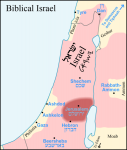Sorry for the Levites – Mass’ei
 “Command the Children of Israel,” says the sidra, “that they should give the Levites out of the inheritance of their possession, cities to dwell in” (Num. 35:2).
“Command the Children of Israel,” says the sidra, “that they should give the Levites out of the inheritance of their possession, cities to dwell in” (Num. 35:2).
Forty-eight cities altogether were to be allocated for the Levites. The allocation took place in the time of Joshua, when “the heads of fathers’ houses of the Levites” came and asked for the cities that God had commanded to be set aside for them.
Two questions arise. Why was no territory specifically earmarked for the Levites as for all the other tribes? And why were the levitical cities scattered throughout the country and not concentrated in one place?
The first question is answered by the sages, when they say that as the tribe of Levi were not enslaved in Egypt like the rest of the tribes (Ex. Rabba 5:16), they did not receive an allocation in the land of Israel.
Rabbi Shimon bar Yochai said, “The land of Israel is one of three things (the others are Torah and the World to Come) which are acquired only through suffering.” A tribe which did not suffer privation in Egypt could not claim part of Israel as of right.
This does not mean that the Levites were not entitled to a home, or that their special spiritual status was unimportant. But it shows that a community that suffers together is special in the sight of God.
An interesting answer to the second question is suggested by GF Maclear in the Cambridge Bible. He says: “Out of the inheritance of their brethren provision was made for them in such a way that, as during the wanderings they had guarded the tabernacle of the Lord, so now they should be scattered as widely as possible in Israel, to bear witness that the people still owed allegiance to Him.”
If this means what it seems to say, it is an argument for mixed neighbourhoods in Israel and elsewhere, with the more orthodox circles not secluding themselves in their own areas but being with, and showing a positive example of the religious way of life to, their fellow citizens.



